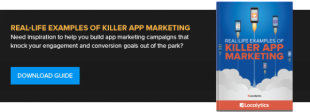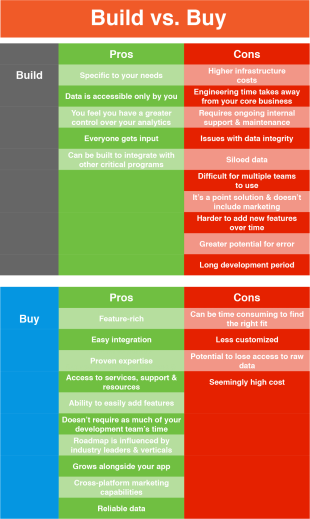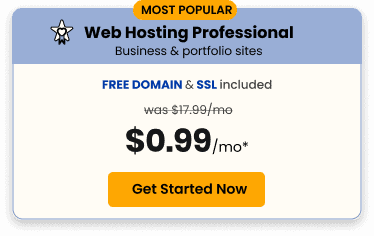There is something inordinately tempting about having complete control over the creation of your analytics platform.
But then again, few things compare to having a team of experts do it for you.
Thus the ongoing dilemma of build vs buy – particularly, when it comes to an analytics solution. Because of the prevalence of analytics today, it can often seem that the best option is to invest in creating a platform custom to your needs (it can’t be that difficult, right?). This is a completely valid approach, and it simply means you think the best possible solution is one that’s built internally. But what about the potential negatives to this approach? These are the elements that can be overlooked at the onset, and only become apparent after you’ve already invested too much time, money and resources.
What we’ve found helps is a thorough lay of the land, complete with pros and cons for both sides, that you can use to evaluate your options before giving the green light.
Build
Pros
- Customized to you: One of the biggest benefits to building your own analytics solution is that you can customize it completely to your needs. You get to oversee what features are built, what you can track, and how it’s displayed. All of your data stays in your hands and isn’t accessible to others, and you have a sense of a greater control over your app analytics.
- Complete control over the process: Plus, from start to end, you have oversight of the development process, and complete and total access to your raw data and any point in time. Having a greater sense of control over the information you gather from app users, and where it resides, can seem hugely important.
- Can be built to integrate with other systems: If your business relies on a host of software, you might be interested in building an analytics platform that easily integrates with your ongoing programs. This can be harder to create using a third-party solution.
Cons
Here’s the question to answer: if you’re not an analytics company, can you afford to divert engineering time, energy and salary away from your core mission to build a platform?
- Distracting from your core mission: In building a platform, your engineering team will have to take time away from further developing new features, products, or other solutions for your customers, meaning your core business will suffer. Beyond that, your engineers, while successful in what they deliver to your business, are likely not mobile analytics experts, and will have to rely on external research in the building process, leaving them without first-person resources or help.
- High costs and inability to scale: You’re also facing large infrastructure costs to develop, store and maintain your platform, not to mention the need for ongoing internal support and maintenance. Whenever you want to add new features or stay on top of important changes in the analytics realm, you’ll have to invest more time into the research, execution and testing of those changes – you can’t just “set it and forget it.” This can lead to a minimal feature set, one missing key elements.
- Data integrity issues: Building a platform yourself, you can’t be completely sure of the integrity of your data. In building, you risk data errors and issues if it isn’t correctly constructed or evaluated over time for effectiveness.
- No room for marketing: Building can lead to the creation of a point solution: it may have been built to meet your app analytics needs now, but it won’t naturally evolve over time without more work. And it won’t include any marketing capabilities whatsoever, lacking advanced features like automation and personalization, which are becoming increasingly important in retaining users. (Take this for example: you have a group of app users you’ve defined as “loyalty” or “power” users, and want to send them a special offer to boost in-app purchases and maintain a good relationship – with a point solution, you can’t send that group of users the push message you want.)
Essentially, it won’t grow as your app grows, and you risk this scenario: if and when the original development team leaves, you’re left with a custom platform that can be difficult to train others on.
Buy
Pros
- Built by experts: The clearest benefit of buying? You have a system in place built by app analytics and marketing experts, whose sole mission is to create the best platform possible, now and in the future. You have access to services, support, engineers and other resources you wouldn’t typically have, to help you customize the feature set and marketing capabilities within your analytics.
- It will grow alongside your app: Third-party products are iterated on quickly and often. This means advanced features you can unlock more readily and frequently, and a broad platform at your disposal. It will be ready to meet your needs as they evolve. Plus, when you’re an active user the product roadmap will be influenced by you, without requiring any of your own in-house work, and by other industry leaders in their fields.
- Advanced capabilities: With Localytics, in particular, you have more than just a single analytics solution – you have a closed-loop platform with the ability to run marketing campaigns from user segments and integrate campaign results into your analytics data. You have a robust feature set at your fingertips; one that allows cross-platform marketing, personalization, and automation.
- Organization-wide access & easy usage: Another benefit is the easy integration and accessibility across your team. As your team members come and go, it doesn’t change, and you can open it up to key members of your organization.
- Potentially more cost-effective: At the on-set, it can seem as though building a platform yourself is cheaper than paying a monthly (or yearly) cost. In the long run, however, third-party solutions tend to be more cost-effective, when you take into account the time, resources and compensation you would devote to in-house construction.
Cons
- Time consuming: Choosing the right platform for your app can be a time-consuming process. You can sometimes feel like you’re being sold something that doesn’t necessarily have everything on your checklist, and the mobile app space is changing so rapidly that it can be difficult to pinpoint exactly what you need and why you would need it.
- Less customized: It can be more difficult to modify a third-party solution to fit your specific needs, potentially leaving you with or without certain features. Plus, sometimes outside platforms won’t have everything you’re looking for.
- Data privacy concerns: You might also have concerns about where your data lives, and having access to raw data about your users. You don’t want a provider who might sell your data, which is a valid concern. These risks can often be assessed in an exploratory call (Localytics, for example, gives you access to all of your raw data and doesn’t sell any of it).
Still not sure which option is better for you? Ask your team, and consult with mobile experts. Try to assess what your long-term needs might be, and if you can scale an in-house solution accordingly. App usage is only growing, so be sure to pick the option that can grow, too.
 Build vs. Buy: What’s the Best Solution for My App Analytics?
Build vs. Buy: What’s the Best Solution for My App Analytics?
This article was syndicated from Business 2 Community: Build vs. Buy: What’s the Best Solution for My App Analytics?
More Tech articles from Business 2 Community:
- The Cloud War Turns Personal with Photos
- Scientists Connect Two Human Brains At Different Locations
- The Web is Getting Slower
- Amazon Echo Will Compete With Apple's Siri Technology
- Now See Your Room Come Alive In Any Colour With The Dulux Visualiser App









